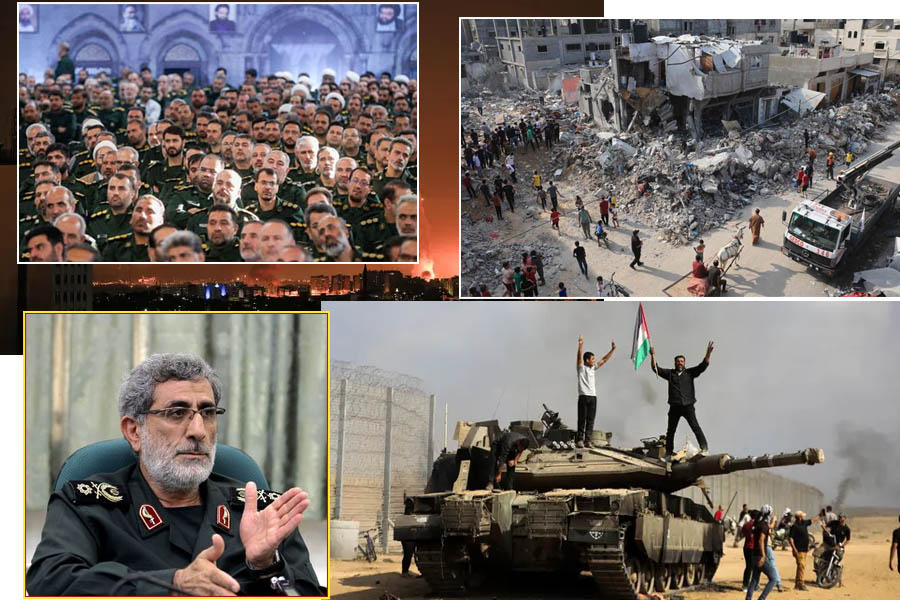
In a shocking turn of events, senior members of Hamas and Hezbollah, Iran-backed militant groups, have revealed that Iranian security officials played a significant role in planning the surprise attack on Israel last Saturday. According to these sources, officers from Iran's Islamic Revolutionary Guard Corps (IRGC) collaborated with Hamas for months to meticulously devise a multifaceted assault involving air, land, and sea incursions, marking the most substantial breach of Israel's borders since the 1973 Yom Kippur War.
The operation's details were reportedly fine-tuned during several high-level meetings in Beirut, where IRGC officers met with representatives from four Iran-backed militant groups, including Hamas and Hezbollah. These revelations have sparked international concern, with many fearing that this direct Iranian involvement could escalate the long-standing conflict between Iran and Israel, potentially leading to a broader conflict in the Middle East.
Despite these claims, both U.S. and Israeli officials have stated that they have not seen concrete evidence linking Iran directly to the attack. Secretary of State Antony Blinken, in an interview with CNN, mentioned that while there is a longstanding relationship between Iran and these militant groups, there is no definitive proof linking Iran to this particular assault.
Iran has vehemently denied these allegations, with a spokesman for Iran's mission to the United Nations asserting that Iran supports Gaza's actions but did not direct them. The spokesman emphasized the autonomous decisions made by the Palestinian resistance, dissociating Iran from direct involvement in the attacks.
If proven true, this revelation unveils a disturbing shift in Iran's strategy. The IRGC's plan reportedly aims to create a multi-front threat to strangle Israel from all sides, with Hezbollah and the Popular Front for the Liberation of Palestine in the north, and Palestinian Islamic Jihad and Hamas in Gaza and the West Bank.
The attack's timing, during a period of internal political divisions within Israel and amidst accelerating U.S.-brokered talks to normalize relations between Saudi Arabia and Israel, suggests a calculated effort to exploit Israel's vulnerabilities. Furthermore, this assault, which has already claimed the lives of approximately 1,000 people in Israel and Gaza, has displaced tens of thousands, creating a humanitarian crisis in the region.
The international community, especially the United States, has responded swiftly to these developments. The U.S. government has expressed its unequivocal support for Israel, deploying the aircraft carrier USS Gerald R. Ford to the eastern Mediterranean and pledging additional assistance to the Israeli Defense Forces.
As the situation continues to unfold, the world watches with bated breath. The coordinated assault on Israel has not only shattered the region's fragile peace but has also rekindled fears of a wider, more devastating conflict in the Middle East. In the face of this escalating crisis, diplomatic efforts and international cooperation are more critical than ever, as they offer the best hope for de-escalation and a return to stability in the region. The Israel-Gaza conflict has reached a critical point, with a coordinated assault by Hamas militants leaving a trail of devastation. The situation has escalated rapidly, causing widespread casualties and displacements. This article delves into the current events surrounding the conflict, highlighting the devastating impact on both Israel and Gaza, the international response, and the escalating tensions in the region.
The Human Cost:
The death toll in Gaza has risen to 436, including 91 children and 61 women, according to Palestinian health officials, with 2,271 wounded. The Israeli death toll has risen to at least 700, including 44 soldiers, as the prime minister, Benjamin Netanyahu, said Israel was embarking on a “long and difficult war”.
The conflict has claimed the lives of about 1100 plus people, and the death toll continues to rise as many remain critically wounded. Gaza, in particular, has been severely affected, with air strikes displacing 123,000 Palestinians, forcing close to 74,000 to seek shelter in schools, according to the UN. Tragically, the conflict's impact was brutally evident when an Israeli airstrike killed 19 members of a Palestinian family in a Gaza refugee camp, as reported by the Associated Press.
International Response:
In response to the crisis, nations around the world have reacted with condemnation and concern. The United States, in particular, has expressed staunch support for Israel, pledging additional resources and deploying the USS Gerald R. Ford closer to the conflict zone. However, the lack of unanimity in the UN Security Council session regarding Hamas's actions has highlighted the complex diplomatic challenges in addressing the conflict.
Impact on Global Affairs:
The conflict's repercussions are not limited to the immediate region. Oil prices surged as investors speculated about a prolonged conflict in the oil-producing region. Additionally, several airlines, including Delta, American Airlines, United, and Air France, suspended flights into Tel Aviv, underscoring the conflict's impact on international travel and trade.
Escalating Tensions and Political Responses:
As the conflict intensifies, leaders worldwide have issued statements, reflecting the gravity of the situation. President Joe Biden has assured Israel of Washington's unwavering support, promising additional assistance for the Israeli Defense Forces. Meanwhile, the British Prime Minister, Rishi Sunak, affirmed Britain's unequivocal support for Israel. On the other side, Iranian President Ebrahim Raisi declared Iran's support for the Palestinians' right to self-defense, adding another layer of complexity to the conflict.
Humanitarian Challenges:
Amidst the conflict, humanitarian concerns have escalated. The UN's World Food Programme has called for the establishment of humanitarian corridors to deliver essential supplies to Gaza, where civilians, including vulnerable children and families, face mounting challenges in accessing food and other necessities.
The Israel-Gaza conflict continues to escalate, posing significant challenges for the people directly affected and raising global concerns. As international leaders grapple with diplomatic solutions, the urgent need for humanitarian aid and efforts to de-escalate tensions remain paramount. The world watches anxiously, hoping for a swift resolution and lasting peace in the region.